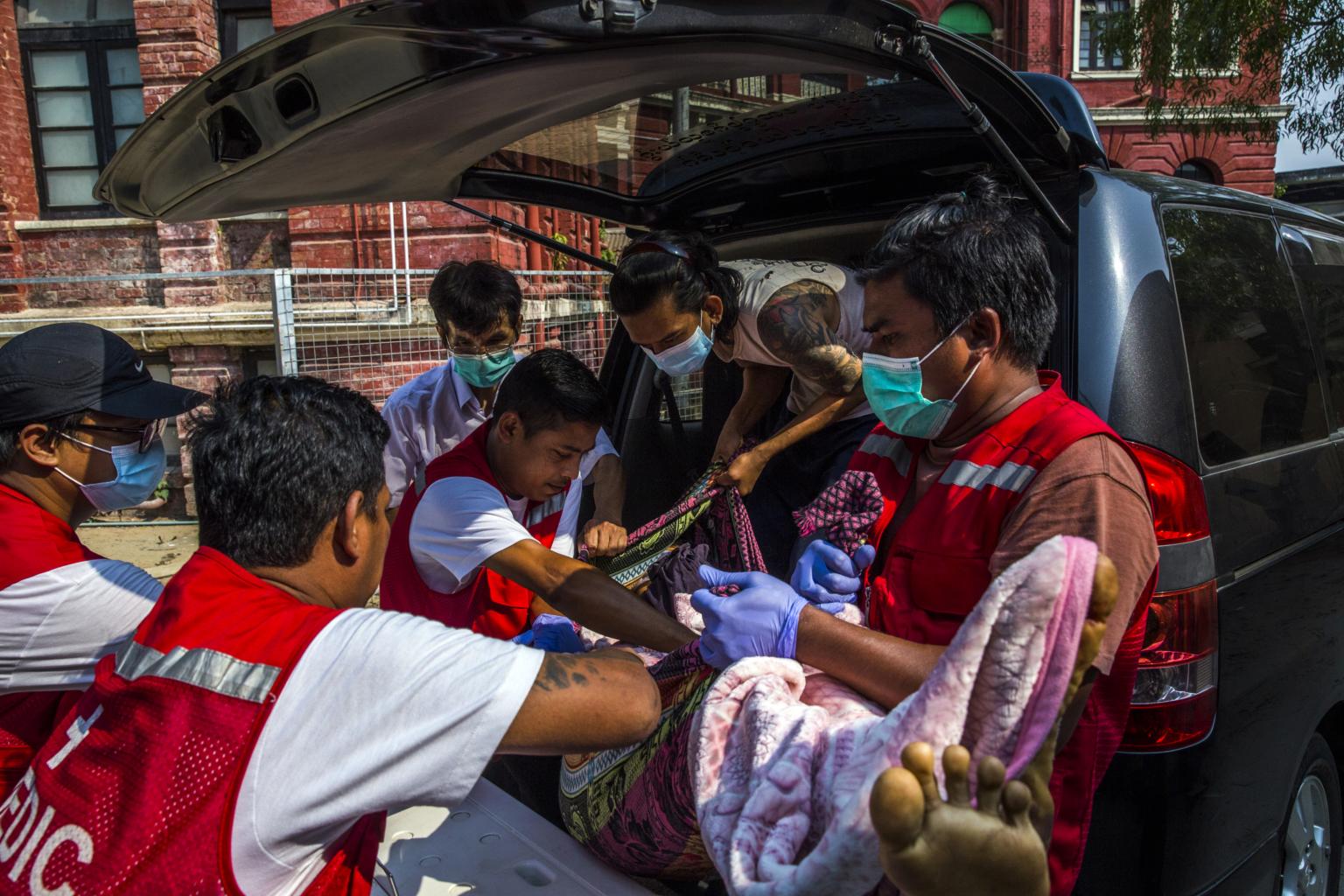Myanmar junta's political prisoners since coup now number 10,000
Sign up now: Get insights on Asia's fast-moving developments

Volunteer medics unload the body of a student protestor who died after being shot during protests in Yangon, on March 27, 2021.
PHOTO: NYTIMES
YANGON (NYTIMES) - The military junta that seized power in Myanmar 14 months ago is now detaining 10,000 political prisoners, a rights organisation that monitors detentions said Thursday (March 31). Many of the prisoners have been tortured and are being held in deplorable conditions, according to the group.
The regime's crackdown has been so harsh that more political prisoners are now being held in Myanmar than were imprisoned in total throughout the half-century of military rule that ended in 2010, said Mr Aung Myo Kyaw, a spokesperson for the rights group, the Assistance Association for Political Prisoners (AAPP).
"We have the largest number of political prisoners in Myanmar's history in barely a year," he said.
Myanmar reached the grim milestone of 10,000 political prisoners held at a single time as the regime continues to imprison suspected opponents at a rate of about 20 people a day, according to AAPP, which has closely tracked arrests since the coup on Feb 1 last year.
That figure does not include the more than 3,000 political prisoners who were arrested and released, often after enduring brutal interrogations and many months in prison. Nearly 2,000 more opponents of the regime are evading arrest warrants, including many who have fled to the jungle to join an armed resistance against the junta.
While celebrating Armed Forces Day on Sunday, Senior General Min Aung Hlaing, the leader of the coup, called opponents of the regime "terrorists" and vowed to "annihilate them to an end." On the same holiday honouring the military a year ago, the security forces killed at least 114 protesters during its deadliest day since taking power.
Not long ago, Western countries had high hopes for democracy in Myanmar.
The military, which first seized power in 1962, began relaxing its grip more than a decade ago, allowing for democratic elections, the proliferation of cellphones and the embrace of social media.
The longtime democracy advocate Aung San Suu Kyi, who had endured 15 years under house arrest, led her National League for Democracy (NLD) party to a landslide election victory in 2015 and formed a civilian government in a power-sharing arrangement with the generals.
But after her party won a second landslide vote in 2020, the military seized full control, imprisoning Ms Suu Kyi, President Win Myint, and at least 640 other officials and party leaders, according to the NLD.
After nationwide protests erupted, the security forces responded by shooting some protesters, arresting others and raiding the homes of suspected critics. The AAPP says at least 1,723 civilians have been killed.
President Joe Biden and Singapore Prime Minister Lee Hsien Loong issued a joint statement in Washington on Tuesday calling on the Myanmar junta to release political prisoners, allow humanitarian access and begin restoring democracy.
"The United States and Singapore share deep concerns about the situation in Myanmar and the challenges it poses to regional stability," the two leaders said. "We continue to call for an end to violence against civilians in Myanmar, the release of all political detainees, including State Counselor Aung San Suu Kyi, President Win Myint and foreign detainees."
US Secretary of State Antony Blinken estimated in December that more than 1 million political prisoners are being held in more than 65 countries around the world.
"More individuals are being unjustly detained or convicted in sham trials with each passing day," he said, citing the case of Ms Suu Kyi, who was sentenced to six years in prison in December and January and faces a dozen more counts. Mr Blinken urged countries detaining political prisoners to free them.
The current regime, in addition to targeting elected officials and party leaders, has gone after journalists, doctors, human rights activists, teachers and celebrities.
Of those imprisoned since the coup, the rights group said, 890 have been convicted and sentenced, often to many years in prison. Of these, 52 have been sentenced to death, including Phyo Zayar Thaw, a famous hip-hop artist and a Member of Parliament, who was arrested in November with a stash of weapons and accused of leading attacks against the regime.
More than 9,100 prisoners are awaiting trial, many of them for more than a year. Sean Turnell, an Australian who was Ms Suu Kyi's economic adviser, is now being tried with her on a charge of violating the colonial-era Official Secrets Act, which carries a sentence of up to 14 years.
The 10,000 figure does not include at least 103 others who have died in custody, many of them from torture during interrogation, AAPP said. For those who reach court, the trials are usually brief, with little opportunity to mount a defence.
Mr Khin Maung Myint, a former prison guard who became a lawyer and now represents defendants detained for opposing the coup, said the system guarantees their incarceration. Some of the accused are tried by military tribunals, where attorneys are barred from attending and defendants receive the maximum sentence, he said.
In civilian courts, defence attorneys are allowed to be present, but they are rarely allowed to cross-examine witnesses. All trials are closed to the public, the hearings are brief and everyone who goes on trial is found guilty, he said.
"No one has been acquitted at all," Mr Khin Maung Myint said. "As more and more people are arrested and convicted, there are more political prisoners in prisons than ever before."


